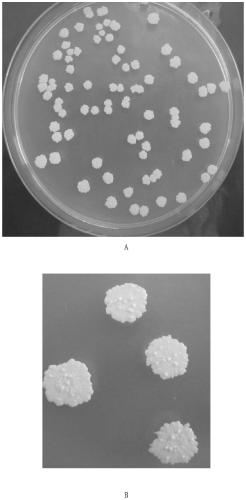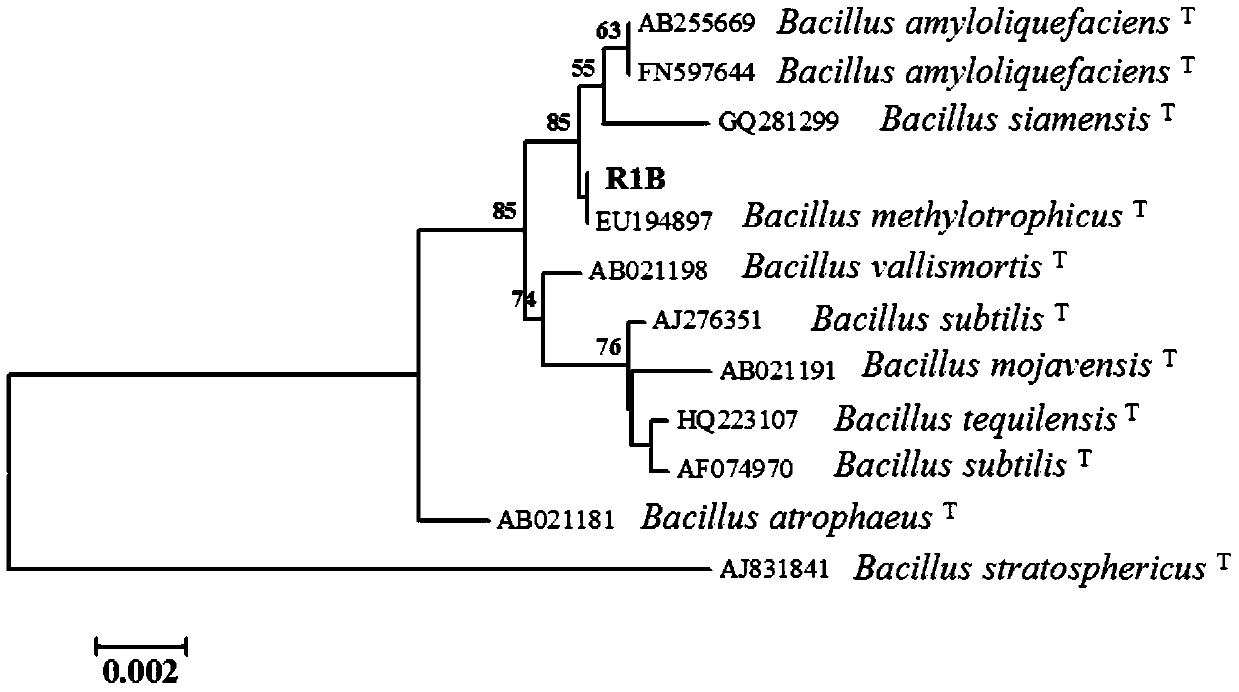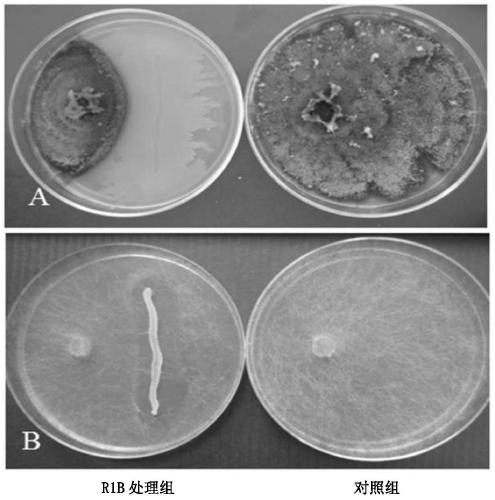A Methylotrophic Bacillus and Its Application to Control Pear Ring Spot and Soft Rot
A methylotrophic and soft rot technology, applied in the field of microorganisms, can solve the problems of increasing the residual amount of toxic chemicals, polluting the ecological environment, pathogenic bacteria resistance, etc., to solve the problems of pesticide residues and environmental pollution, huge application potential, The effect of easy operation
- Summary
- Abstract
- Description
- Claims
- Application Information
AI Technical Summary
Problems solved by technology
Method used
Image
Examples
Embodiment 1
[0049] Example 1, Isolation and Identification of Methylotrophic Bacillus Strain R1B
[0050] 1. Isolation and purification of strain R1B
[0051] 1. Rinse Dendrobium Huoshanense collected from Lu'an, Anhui with tap water, rinse with distilled water, dry and cut the roots, stems and leaves into small pieces for surface disinfection. The disinfection method is as follows: treat with 70% alcohol for 40-60 seconds, rinse with sterile water, then treat with 2.5% sodium hypochlorite solution for 2-5 minutes, and rinse with sterile water for 3-4 times.
[0052] 2. Under sterile conditions, take 100 μL of the sterile water produced by the last rinse and spread it on the beef extract medium, incubate at 30°C for 24-72 hours, observe whether there are colonies, and verify whether this disinfection method kills the bacteria. microorganisms on the surface of the test material.
[0053] 3. Under sterile conditions, cut the roots, stems and leaves of Dendrobium Huoshanense into 0.2cm 2 ...
Embodiment 2
[0070] Embodiment 2, the application of bacterial strain R1B in antibacterial or antibacterial
[0071] 1. Antagonistic activity of strain R1B against pear ringworm and soft rot bacteria
[0072] The pathogenic strains Botryosphaeria dothidea and Rhizopus stolonifer were respectively activated on the PDA medium, and the fungus cakes were punched out with a 6mm punch to obtain the cakes of Botryosphaeria dothidea and Rhizopus stolonifer respectively. Using the confrontation culture method, respectively inoculate the pear ringworm bacteria cake and soft rot bacteria cake on one side of a PDA plate with a diameter of 9 cm, and inoculate the strain R1B on the opposite side, with a distance of 3-4 cm between the two inoculation points, and inoculate separately The pathogenic strains on the PDA flat plate are the ringworm of pear and the soft rot fungus as a control. Set up 3 replicates, culture at 25°C, measure the diameter of the treated colony and the width of the bacteriostatic...
Embodiment 3
[0084] Embodiment 3, the application of bacterial strain R1B in the prevention and treatment of pear fruit ring spot
[0085] 1. Control effect of strain R1B on pear fruit ring spot
[0086] 1. Pear pretreatment
[0087] Select fruits that are neat in appearance, free of diseases and insect pests, and free of trauma, first rinse them with tap water, then spray them with 75% alcohol for disinfection, and dry the surface with sterile filter paper after 2 minutes for later use.
[0088] 2. R1B bacterial suspension treatment
[0089] Use a sterile puncher (diameter 6mm) to symmetrically punch two wounds with the same depth as possible on the surface of the fruit, and inoculate 50 μL of 5×10 7 CFU / ml of R1B bacterial suspension (R1B treatment group, R1B) and the same amount of sterile water (control group, ck), each treatment of 8 fruits, repeated 3 times, and placed at room temperature for one day.
[0090] 3. Inoculation of pathogenic bacteria
[0091] Inoculate R1B treatment...
PUM
 Login to View More
Login to View More Abstract
Description
Claims
Application Information
 Login to View More
Login to View More - R&D
- Intellectual Property
- Life Sciences
- Materials
- Tech Scout
- Unparalleled Data Quality
- Higher Quality Content
- 60% Fewer Hallucinations
Browse by: Latest US Patents, China's latest patents, Technical Efficacy Thesaurus, Application Domain, Technology Topic, Popular Technical Reports.
© 2025 PatSnap. All rights reserved.Legal|Privacy policy|Modern Slavery Act Transparency Statement|Sitemap|About US| Contact US: help@patsnap.com



